Almost a decade after it was first proposed, Ireland's first ever Medically Supervised Injection Facility (MSIF) opened its doors at Merchants Quay Ireland (MQI) in December. Six weeks into this 18-month pilot scheme, Prime Time visited the centre, hearing from drug users, staff and those who still hold concerns about the facility.
Until recently, Brian and Aoife would regularly inject heroin on the streets of Dublin.
They agreed to speak to Prime Time anonymously as they brought heroin into the centre, where they can legally and safely inject illegal drugs.
"It's the act that you do four to six times a day, and every time I'm filth, I'm a junkie, I'm worthless. To have this space, [it] gives you back that basic humanity and respect," Aoife told Prime Time.
"There aren’t really words for it, the difference of having the most intensely stigmatised, shameful thing to be accepted. It is new, it is revolutionary," she added.
"This place is...it's a godsend," Brian said.
The centre first opened in December, despite strong objections from local residents, businesses and a school nearby. During the planning process alone there were almost 100 objections made.
The facility cost €5m and is a key part of the national drug strategy, called ‘Reducing Harm, Supporting Recovery.’ Its development was part of the previous Programme for Government.
MQI is funded for 56 hours a week, which is broken down into two four-hour sessions a day.
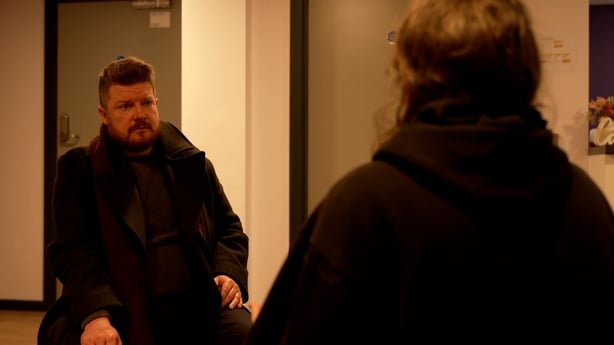
While the pilot is now running, the concept is being assessed, but the long term location of any such centre is not yet defined.
The current Government has said it will "explore the establishment of mobile medically supervised injecting facilities in areas of need."
Some 233 people have made 836 visits to the facility already, data provided to Prime Time shows. Staff have treated 15 overdoses in that time period.
Proponents of such facilities argue that they can reduce overdosing - and the related risks - public injecting, and drug-related litter.
For Aoife, she hopes the facility is "the start of a culture that will embrace us instead of rejecting us and putting us back into the dark. We don't deserve that."
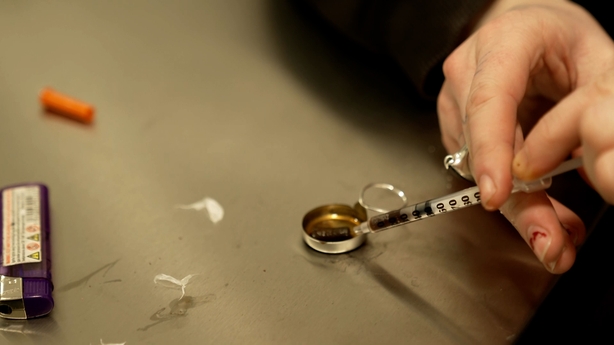
A 2018 report from the European Monitoring Centre for Drugs and Drug Addiction (EMCDDA) said research across different jurisdictions shows providing supervised drug consumption facilities "may include improvements in safe, hygienic drug use, especially among regular clients, increased access to health and social services, and reduced public drug use and associated nuisance."
The report added that, "There is no evidence to suggest that the availability of safer injecting facilities increases drug use or frequency of injecting."
While clients like Aoife and Brian have welcomed the opening of the centre, others believe it is not truly helping drug users.
"My main concern is, as has always been, is that it really is just maintaining people in addiction. It's not trying to get to the core problem of tackling addiction," says Independent Dublin City Councillor, Cieran Perry.
He argues that "the referral rates historically are extremely poor from facilities like this. If the purpose was to actually tackle the personal addiction and to get people off drugs to provide detoxification or rehabilitation, I'd be much more inclined trying to support the project."
"What we're doing is giving them some respite and then allowing them, facilitating them, to continue to poison themselves," Cllr Perry told Prime Time.
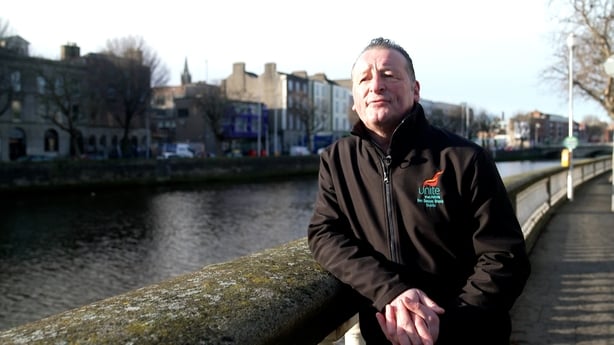
The addiction and homeless services charity, Merchants Quay Ireland (MQI), manages the centre. CEO Eddie Mullins told Prime Time that "like many other organisations, we don't support drug use, we support people who use drugs."
He says that their focus is to provide a service to people who "are very, very traumatised, very sick in many ways. People who need support, need help."
In response to criticism of the concept of supervised injecting centres, he said "who want to find evidence to suggest that it doesn't work will find evidence, because there's plenty of contradictory evidence."
One of the key arguments for such centres is that drug users will be medically supervised, which could reduce overdoses.
Recent figures show that drug deaths in Ireland are four times the EU average. According to the European Drug Report 2024, Ireland had 322 drug-induced deaths in 2020 — 97 deaths per million people, compared to the EU average of 22.5.
Orla Condren is a nurse at the centre and told Prime Time that the service is currently seeing around 35 people a day.
"We know that people overdose on the streets, and we know that they die because they overdose in an area where they're not supervised," she told Prime Time.
"At the moment, we're seeing approximately an average of about three overdoses per week. To date, we've treated each and every one of those overdoses with oxygen therapy. We haven't had to call any ambulances, and we haven't had to give anybody naloxone. So that in itself has been hugely successful."
"The joy of here is that you're observing someone at all times. So, you'll see the signs of an overdose quite quickly."
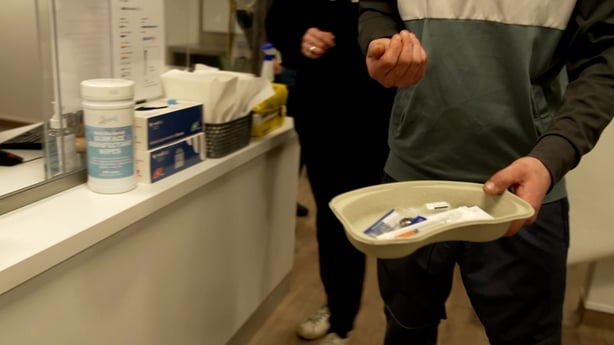
Drug litter remains evident
In 2018, Prime Time examined the case for a supervised injection facility in Dublin. Some of the arguments for the service at the time were that it would dramatically reduce the amount of drug paraphernalia on the streets of the capital.
As part of that programme, Prime Time showed the level of syringes and other drug paraphernalia on the streets of Dublin.
To see if this had reduced in the six weeks the facility has been open, Prime Time went out filming again with the MQI team, who collect and weigh drug paraphernalia from the surrounding streets.
There are still plenty of used syringes and other equipment in plain sight.
"In the relatively short time the facility has been opened you can see people still injecting openly, it’s important we still patrol engage with people and let them know the facility is open," Alan Dooley, who works as part of the team, told Prime Time.
MQI CEO Eddie Mullins said a reduction in the level of discarded syringes will take time.
"We've been very methodical in our approach to this. So we have monitored clearly all of the drug paraphernalia and the other issues associated with drug taking on the street over the last 12 months. We will be able to demonstrate that there has been a reduction."
"Of course it's not going to resolve it overnight, and it may never take all drug taking off the street, or all injecting off the street." he added.
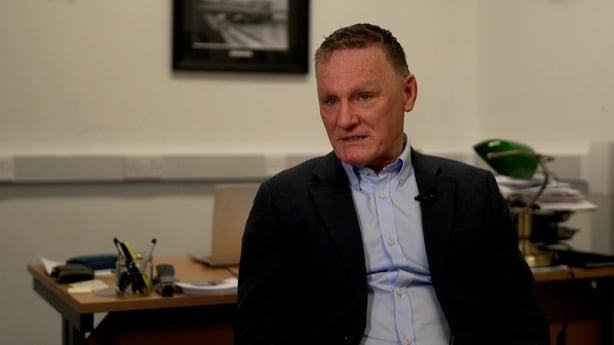
Rise of crack cocaine
Another of the arguments in favour of the injection facility was that it would help reduce drug use on the streets of Dublin. Discussions among politicians and policymakers about establishing began as far back as 2015.
In the years since, the habits and preferences of drug users have shifted and the use of crack cocaine has become more prevalent and visible.
A smaller proportion of people with addictions are injecting drugs, and more are smoking – typically cocaine. The centre which has been opened is only to supervise the injection of drugs.
Over the course of just a few hours in Temple Bar, Prime Time filmed multiple examples of crack cocaine being smoked openly in public.
"My opinion is certainly the trends out in the community at the moment, the crack [cocaine] is a bigger problem," Eddie Mullins told Prime Time.
Of new cases that were treated for problem drug use in 2023, 46% were for cocaine, according to the Health Research Board, while there was a 228% increase in the number of cases where cocaine was the main problem drug between 2017 and 2023.
In that time, powder cocaine use increased by 197% and crack cocaine increased by 594%.
Asked whether there is now a greater case for a consumption room to be opened where drugs like crack can be smoked legally, Mr Mullins said: "Certainly if we look in other jurisdictions, injection facilities have transitioned into consumption rooms. That's not for me to decide."
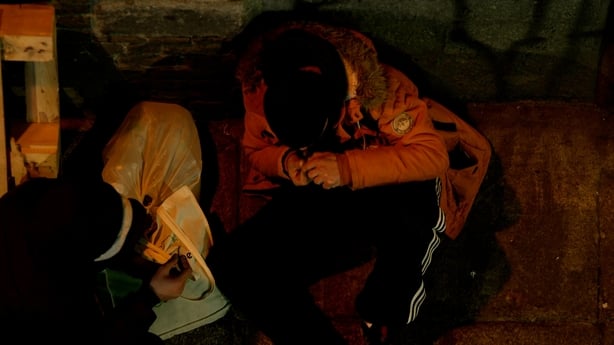
Open drug dealing
Some of the objections to the centre being opened came from local businesses who said providing a space to use drugs legally won’t reduce drug dealing but could create a captive market for drug dealers.
Local business association, the Temple Bar Company, said they support a service that would provide users with drugs, to try to reduce dealing in the area.
"We have long advocated for a Supervised Injecting Centre to provide addicts with heroin to prevent this lacuna in the law from becoming a problem."
"It would also remove the incentive for heroin dealers to operate within the area where the treatment centre is located," it said in a statement.
Mr Mullins said: "This facility, in my view, will not exacerbate in any way drug selling on the street because the people who were using the facility probably had the heroin on them in the first place. They just couldn't inject it."
On the issue of providing heroin for users, Mr Mullins does not think it’s a viable option in Ireland.
"Honest answer: I haven't considered it because it's realistically significant. It's not going to happen. It's not on anybody's radar."
Only open six weeks, it’s too early to properly measure the success of the MQI supervised injection facility. The pilot project will run for 18 months and its performance and targets will be evaluated before a decision is made on extending it or possibly opening similar facilities in other parts of the country.
While making this report, Prime Time found drug dealing and antisocial behaviour in the area around the facility is still very much in evidence.
Mr Mullins said MQI is "working very closely with agencies like UISCE [Union for Improved Services, Communication and Education] and Dublin City Council and the Guards and various other state services to try and minimise that."
"I mean, it's a problem in all of our communities. It's obvious. It has been obvious on the quays for quite a long time."
In a statement to Prime Time, An Garda Síochána said that outside of the injection facilities, "possession of controlled drugs under the Misuse of Drugs Acts, as amended, remains a criminal offence in line with the report and recommendations of the Citizens Assembly on Drug Use."
An Garda Síochána said it is "taking a balanced and proportionate approach to policing in the environs of the established MSIF."
For those currently using its services, the centre has already made a positive impact.
"It might give me and others the space to actually re-evaluate a bit and maybe start thinking about reducing. I'm doing that at the moment," Aoife told Prime Time.
"I go through the process of what can I do to maybe change things and make a step forward. I really hope and expect it will be that for a lot more people, as more people gain the confidence to explore it."
If you have been affected by the issues raised in this story you can speak to someone by contacting one of the numbers at rte.ie/ie/helplines.
Conor Wilson and Isabel Perceval’s report on Ireland’s first supervised drug injection centre airs on Prime Time on 13 February on RTÉ One and RTÉ Player.







